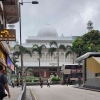A new national security law for Hong Kong was overwhelmingly approved by China's top legislative body on June 30 and became effective in the colony that very same day, just before midnight. The law is dangerously ambiguous and wide; under its provisions, anything may be considered a threat to "national security," and it could be used against everyone on the earth.
The law was pushed through by the Chinese government without any oversight or transparency; it was passed shortly after it was first announced, bypassing Hong Kong's local legislature, and the text was allegedly withheld from the general public and even the Hong Kong government until it was put into effect.
Ten reasons are listed below why this new law should worry everyone:
1. "Endangering Security" means everything even private rights:
The maximum punishment under this new law for "secession," "subversion," "terrorism," and "collusion with foreign forces" is life in jail. However, because they have such a broad definition, these offenses are easily turned into catch-all ones that are utilized in politically motivated prosecutions with potentially severe consequences.
The National Security Act's wide wording, according to the UN human rights office and other expert organisations, might result in "discriminatory or arbitrary interpretation and enforcement that could undermine human rights protection," they have previously expressed concerns about it.
2. The Law has been abused by the authority:
As soon as the law was passed, authorities began to utilize it to repress acceptable and peaceful discourse.
For having flags, bumper stickers, and banners with political statements, people were detained. The national security could be endangered by slogans, T-shirts, songs, and pieces of white paper, according to police and government authorities. These things could potentially result in criminal charges.
The slogan "Liberate Hong Kong, the revolution of our times," which was popular during last year's protests, was essentially banned by the Hong Kong government two days after the bill was approved because it "connotes [Hong Kong independence], or separating Hong Kong from China."
3. The Law could control education, journalism and Social Media:
The law provides the Chinese central government and the Hong Kong government new, sweeping authority to control and administer Hong Kong's schools, social groups, media, and internet in the name of national security.
For instance, The New York Times has already made the decision to transfer some of their Hong Kong employees to South Korea.
Currently, in order to lawfully work in mainland China, journalists must first seek authorization from the Chinese government.











